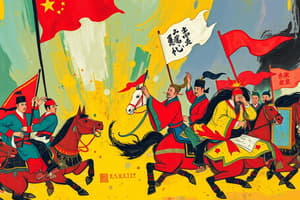Podcast
Questions and Answers
What were the three principles proposed by Sun as part of the Republican Revolution in China?
What were the three principles proposed by Sun as part of the Republican Revolution in China?
- Nationalism, Socialism, Industrialization
- Nationalism, Communism, Livelihood
- Nationalism, Democracy, Livelihood (correct)
- Nationalism, Democracy, Industrialization
Why did Chinese students demonstrate at Tiananmen Square on May 4, 1919?
Why did Chinese students demonstrate at Tiananmen Square on May 4, 1919?
- To support Yuan Shi-kai's dictatorship
- To express their love for liberty and freedom (correct)
- To show support for European Imperialists
- To protest against the Chinese government
What led to the Chinese students' shift towards favoring Lenin's Soviet Communism over Sun's principles?
What led to the Chinese students' shift towards favoring Lenin's Soviet Communism over Sun's principles?
- The Treaty of Versailles
- The discontent towards Western democracy (correct)
- The influence of Mao Tse-tung
- The failure of the Nationalist Party
Why did warlords start rebelling against the Nationalist Party after Sun turned over the presidency to Yuan Shi-kai?
Why did warlords start rebelling against the Nationalist Party after Sun turned over the presidency to Yuan Shi-kai?
How did the Treaty of Versailles impact China's territorial situation?
How did the Treaty of Versailles impact China's territorial situation?
Who later became known as China's greatest revolutionary leader after being arrested as a student protester during the May Fourth Movement?
Who later became known as China's greatest revolutionary leader after being arrested as a student protester during the May Fourth Movement?
What was the primary goal of the Boxers Rebellion?
What was the primary goal of the Boxers Rebellion?
Which of the following was NOT a cause of the Boxers Rebellion?
Which of the following was NOT a cause of the Boxers Rebellion?
What was the primary goal of the Kuomintang (Nationalist Party) founded by Sun Yat-sen?
What was the primary goal of the Kuomintang (Nationalist Party) founded by Sun Yat-sen?
What were Sun Yat-sen's "Three Principles of the People" based on?
What were Sun Yat-sen's "Three Principles of the People" based on?
What was Hong Xiuquan's claim that led to the Taiping Rebellion?
What was Hong Xiuquan's claim that led to the Taiping Rebellion?
What was Sun Yat-sen's role in the establishment of the Chinese Republic?
What was Sun Yat-sen's role in the establishment of the Chinese Republic?
Flashcards are hidden until you start studying
Study Notes
The Three Principles of the People
- Sun Yat-sen's vision consisted of three principles: Nationalism, Democracy, and Livelihood.
- Nationalism aimed to end foreign influence and control in China and achieve political unification.
- Democracy sought to establish a gradual transition to a democratic government with full personal liberties and rights for all.
- Livelihood focused on economic improvements, including land reforms, industrialization, and economic security for all Chinese.
The Republican Revolution
- Sun Yat-sen's leadership was confined to a small region around Canton, in southern China.
- The rest of the country was divided among various warlords.
- In 1913, Sun turned over the presidency to Yuan Shi-kai, who ruled as a dictator and did not follow the three principles.
- This led to a revolt against Yuan's rule, and soon after, warlords started to rebel against the Nationalist Party.
The May Fourth Movement
- The Treaty of Versailles (June 28, 1919) granted the territories formerly occupied by Germany to Japan, angering the Chinese.
- On May 4, 1919, Chinese students held a demonstration at Tiananmen Square, shouting "Down with the European Imperialist!" and "Boycott Japan!"
- This movement expressed the students' love for liberty and freedom, as well as their goal of establishing a modern nation.
The Rise of Communism
- Mao Tse-tung, a student protester, was arrested and later became China's greatest revolutionary leader.
- Young Chinese intellectuals turned against Sun's principles of Western democracy, favoring Lenin's Soviet Communism instead.
- Communism, derived from Karl Marx's theories, aims to establish a society with publicly owned property, where each person works and contributes according to their ability.
The Boxers Rebellion
- The Boxers Rebellion (1890) was led by the Society of Righteous Harmonious Fists, who sought to drive out foreigners from China.
- Causes of the rebellion included China's inability to defend itself against imperialism, the Empress's perceived corruption, resentment towards foreigners' special privileges, and anger towards Chinese Christians protected by foreign missionaries.
- The Boxers were ultimately defeated due to European superior weapons.
The Kuomintang (Nationalist Party)
- The Kuomintang, founded by Sun Yat-sen, was the most popular group seeking to develop China into a modern society.
- Sun Yat-sen, also known as "The Father of the Chinese Republic," studied in the US and learned Western ideals.
- He hoped to establish a modern government based on the "Three Principles of the People."
- Sun became the new president in 1912 but held the post for only six weeks.
Studying That Suits You
Use AI to generate personalized quizzes and flashcards to suit your learning preferences.




